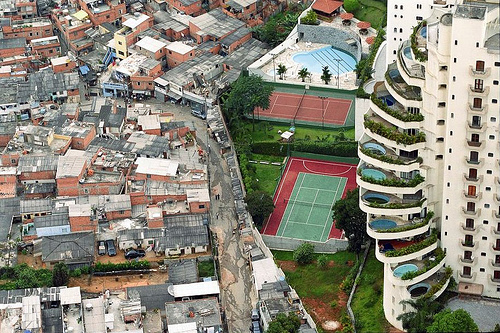
The world is stuck in a prolonged downturn--growing inequity and a spiral toward environmental meltdown--and we can't seem to find a way to turn the corner. Not surprisingly, there is much talk these days about job creators--in US politics as well as geopolitics.
Two camps seem to dominate this debate. The first camp advocates cutting taxes for the rich, under the assumption that their investment and spending will "trickle down" to everyone else. The second camp wants to focus attention on the little guy--the small and medium enterprise (SME) sector, under the assumption that assistance for "mom and pop" enterprises will enable them to grow and flourish from the "bottom up."
The reality, in my view, is that neither the "trickle down" nor the "bottom up" perspectives will get us out of the hole that we are in.
Some years ago (1978 to be exact) Filley and Aldag published a wonderful piece in the Academy of Management Journal entitled "Characteristics and measurement of an organizational typology." In this article they empirically classified organizations into one of three types: Administrative, Craft, and Promotional.
Administrative organizations are established enterprises that are run by professional managers using formal systems of reward and incentives. At best, they generate slow, linear growth since they typically compete in established industries where unsustainable practices and bureaucracy reign supreme among incumbents. And they produce few jobs, since their focus is on increasing labor productivity rather than employment. Indeed, the corporate sector (the largest of the administrative organizations) makes up fewer than one percent of the world's enterprises and has actually shed jobs over the past decade, at least in the developed world.
Craft organizations comprise the vast majority of the world's enterprises which are created by their owners for the purposes of convenience or survival. Most "mom and pops" fit into this category and their defining characteristics are informality and a desire for stability. It should come as little surprise that the small shops and microenterprises of the world produce little in the way of job or employment growth since they are seldom started or run by real entrepreneurs. Indeed, those at the low end of the income scale are typically entrepreneurs by necessity rather than choice: Given the option, most would prefer a good job for a decent wage. Expecting the world's craft enterprises to somehow rescue us from our current malaise is therefore a false hope a best and a shibboleth at worst.
That leaves us with Promotional organizations, which constitute only a small fraction of the world's SMEs. Promotional enterprises are started by entrepreneurs whose intention is to get big. They are driven by a passion for achievement and will stop at nothing to realize this dream. Most fail. But the few (less than 10%) that succeed are the real job creators and growth engines for the future.
The good news is that promotional enterprises can come from anywhere in the world and need not be focused exclusively on the development and commercialization of new technology. In fact, entrepreneurs focused on solving social and environmental problems through enterprise are some of the most passionate and driven people on the planet. Our challenge (and the leverage point for the future) is therefore to devise ways to multiply the number and success rate of this new breed of promotional enterprise.
 As a co-founder of the new Indian Institute for Sustainable Enterprise, I aim to do just that--dramatically increase the number and success of entrepreneurs and intrapreneurs focused on socially inclusive and environmentally sustainable business development for the 21st century.
As a co-founder of the new Indian Institute for Sustainable Enterprise, I aim to do just that--dramatically increase the number and success of entrepreneurs and intrapreneurs focused on socially inclusive and environmentally sustainable business development for the 21st century. To realize this vision, IISE has assembled a complete innovation ecosystem to foster the creation of tomorrow's distributed and sustainable infrastructure, including an education platform, incubator, investment fund, technology bank, cluster (social) network, learning laboratory, and field support system.
The flagship offering is the Post-Graduate
 Certificate Program in Sustainable Enterprise which aims to create nothing less than a new model of business and entrepreneurial development appropriate to the challenges we face in the 21st century.
Certificate Program in Sustainable Enterprise which aims to create nothing less than a new model of business and entrepreneurial development appropriate to the challenges we face in the 21st century.The future lies in neither trickle down nor pure bottom up, but rather "trickle up."
The real job creators will drive innovation from the base of the pyramid, creating the companies and industries of tomorrow and a more sustainable way of living for the world.
The real job creators will drive innovation from the base of the pyramid, creating the companies and industries of tomorrow and a more sustainable way of living for the world.
Maybe you should call it the "gush-up" model instead of trickle up, since the effect is to spread a powerful motive force through a wide volume!
The fundamental principle which stands out for me in your highly commendable plan is that of the interweaving of many different disciplines and types of activity. This is the opposite of the way industry functioned in the Henry Ford era, where each activity was entirely separate and managed. And while many developments have made this interconnected mode possible, the Internet stands out as the most important.
There is no doubt that with the collaboration and cross-boundary capabilities afforded by the Internet, we are entering an era which is dramatically different from the past (represented by your trickle down and bottom up modes). Thank you for this article!